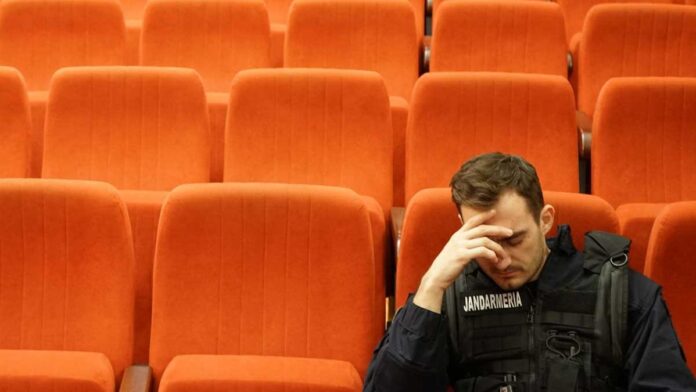“Poppy Field” is director Eugen Jebeleanu’s striking debut, available April 8 in virtual cinemas. Cristi (Conrad Mericoffer) is a closeted Romanian man first seen spending time with his French lover Hadi (Radouan Leflahi), who is visiting Bucharest. Cristi’s sister, Catalina (Cendana Trifan) shows up, unexpectedly, but deliberately, to meet her brother’s boyfriend. However, things are chilly between the siblings, and Catalina upsets the lovers’ cozy domesticity.
When Cristi heads off to work — he is a cop — he is forced to resolve a standoff in a movie theater, where an ultra-nationalist, homophobic group has disrupted the screening of a queer film. During this extended sequence, Cristi attacks a gay man who could out him, forcing the cop to be exiled in the theater while the situation is resolved. One by one, various colleagues “babysit” Cristi and try to calm him down. Each recounts a story of acceptance that never explicitly acknowledges what Cristi fears most — being outed.
It’s a canny approach to showing that homosexuality is not discussed in Romania, and it culminates in a quietly powerful ending. Jebeleanu shoots with a handheld camera to capture Cristi’s emotions and expressions in what feels like real time. Mericoffer gives a remarkable performance; he is completely unselfconscious playing someone who is incredibly self-conscious.
PGN spoke with Jebeleanu via Zoom about “Poppy Field.”
Your film starts out very micro with the gay couple and then gets more macro with the incident in the theater. Can you talk about making a film both personal and political?
I did not want this to be a coming out story. I didn’t want to show how this day is changing his whole life, because 24 hours won’t change a whole life. It just poses questions. For me, it was important for the character to see how politics can influence our inner life, but also how intimacy is changed by political things. The idea was to show the context of Cristi’s life and his relationship. His boyfriend Hadi is living with more freedom. I wanted to put his sister in the film to show how family from the micro-society is changing him and causing him conflict. I lived that with my own brother. When I told my brother I was gay, he said it was a phase and it will pass. I wanted to show how Cristi deals with this identity struggle, and how, in the conflict in the cinema, we see his own homophobia come out. It was important not to make him a victim or a hero, but to show that all we learn and live, and change our own options about ourselves and this subject.
What decisions did you make in presenting the relationship between Cristi and Hadi?
It was to show Cristi is not having an “adventure” for the first time, or one time. It’s more about the [long-distance] relationship being more serious, and how Hadi is staking the territory of Cristi’s apartment. This is what makes Cristi anxious; he doesn’t know how to share his space. He tries to feel free with his partner, but he’s not used to it, and doesn’t know how to react, move, be, or manage the situation. I wanted to show their relationship was not just about sex. It’s Cristi learning how to be who he is and coming to understand himself. He’s creating a big monster from his own fears about what others will think, or will say, or judge.
Conrad Mericoffer is very intense and gives such an interior performance. How did you work with him on the role?
Conrad was really relaxed, but he expresses something mysterious and anxious at the same time. That is what makes the character so powerful. It’s about his inner anxiety. We don’t know where it’s coming from — from this event, or something deeper? Even though we talked about the character’s backstory, we never tried to understand his sexuality. His sexuality is not changing his way of being, acting, or speaking. It was more about his fears, and his difficulty to feel secure with himself and others. Not about how he lies or hides who he is, but more about what he has inside, and his authenticity. What was more difficult for him was seeing him in his silent moments and reactions. He’s not someone who is expressive.
Can you describe the attitudes about homosexuality in Romania?
A cop we talked with during pre-production said if they know someone is gay, they don’t discuss it; they don’t want to validate it — but they are not against it. I put the other cops in the film in the position of not knowing if they are against Cristi or not. In Romania, people are becoming more open to the idea of homosexuality — but we still have a lot of work to do. It’s still a taboo subject and we don’t talk about it. It comes from inequality between men and women, and this macho society, and anything that is non-traditional. The Orthodox church is very powerful here. They wanted to change the definition of family in the constitution.
